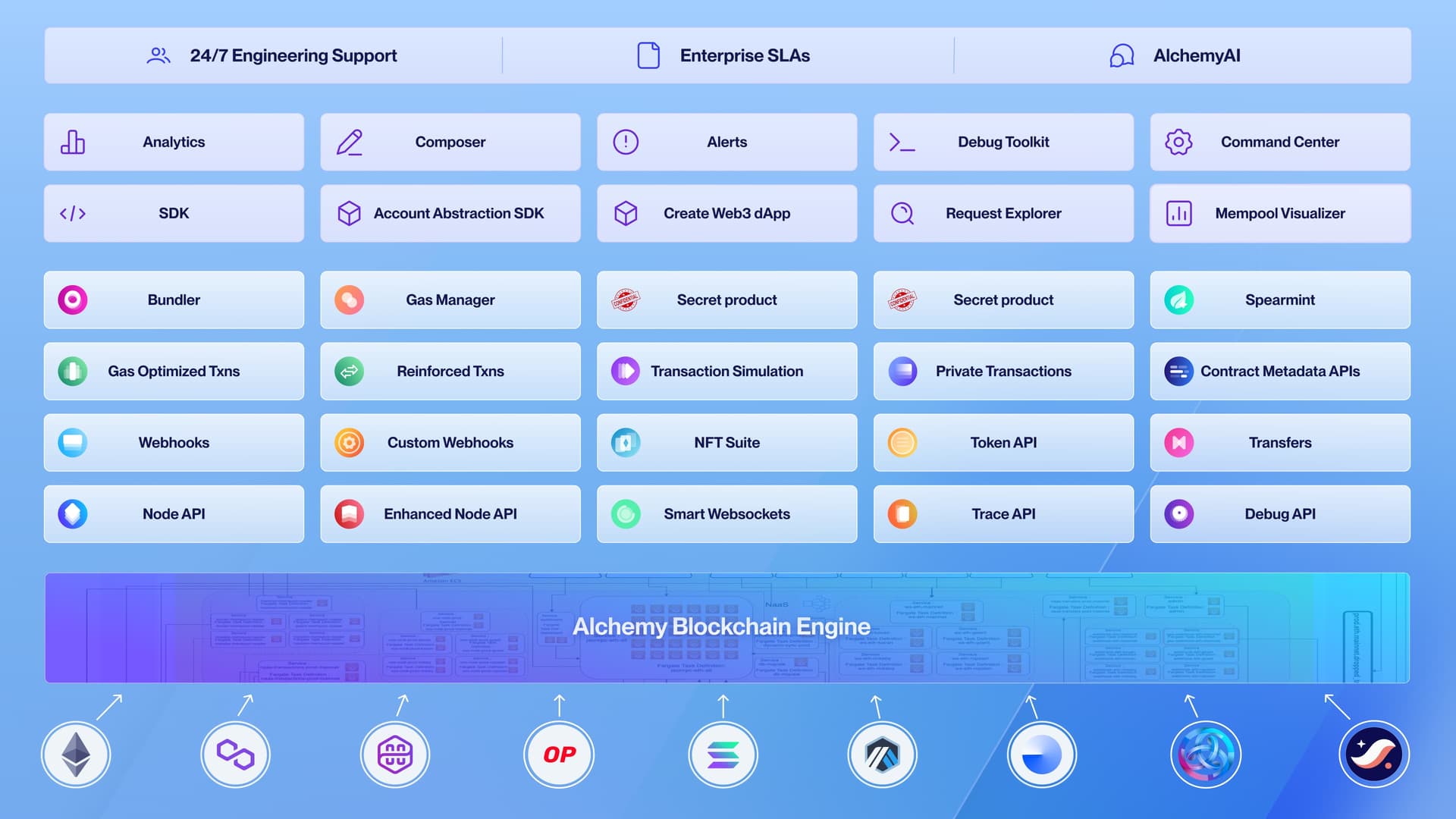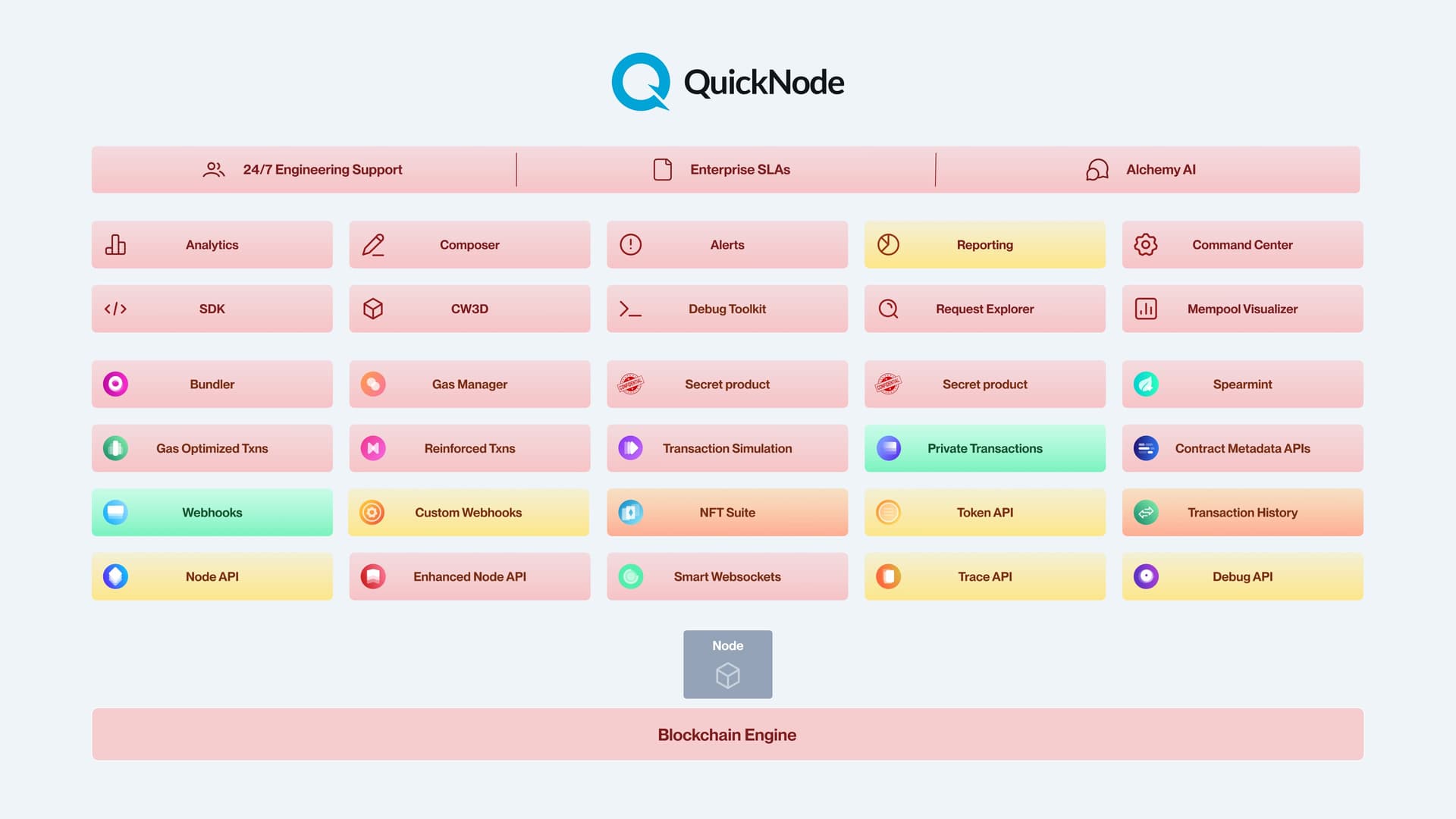
What is the best free Ethereum RPC? Alchemy vs. Quicknode
Written by Alchemy
Alchemy's free plan offers up to 10x more computing resources for overlapping JSON-RPC calls than Quicknode's free plan.
The best free Ethereum RPC access is provided by Alchemy's blockchain development platform. Alchemy's blockchain development platform provides more free RPC node access with more accurate and reliable data, and more web3 tools and APIs compared to Quicknode.
In this article, we will compare both free options to help you determine which Ethereum node provider is best for you.
How does Alchemy Free Tier compare to Quicknode Free Tier?
The main difference between Alchemy and Quicknode is that Alchemy offers up to 10x more power for overlapping JSON-RPC than Quicknode.
It is critical to note that Alchemy's CUs and Quicknode's API credits are not equally weighted 1:1. Which is why we'll give a thorough breakdown of their compute cost comparison in the next section.
What is the difference between Alchemy's Compute Units and Quicknode's API Credits?
Alchemy uses Compute Units (CUs) to measure the total computational resources dapps use on Alchemy, while Quicknode uses API "Credits" to determine the relative cost of each Ethereum RPC method. Compute Units and API Credits are analogous to compute usage on AWS.
CUs are used to measure computational resources because some blockchain queries are cheap and lightweight, like the eth_blockNumber RPC request, while others are more computationally expensive, like eth_getLogs.
For both web3 infrastructure providers, each method is assigned a total number of CUs or API Credits, which can be used to calculate how much free Ethereum compute is offered to customers on their free node tier.
What is included in Alchemy's Free Teir?
Here are the main highlights of Alchemy’s free tier:
Compute Units: 300,000,000/month
Throughput: 330 CUs/second
Archive Data Access: Yes
Number of dapps: 5
Support: 24/7 Discord Support
Additional APIs: NFT API, Transfers API, Transaction Receipts API, Trace API, Token API, Notify API (Webhooks), Subscription API (WebSockets), Debug API

What is included in Quicknode's Free Tier?
Here are the main highlights of Quicknode’s free tier:
API Credits: 10,000,000
Throughput: 25 requests/sec
Archive Data Access: Yes
Number of Endpoints: 1
Support: Community Support
Additional APIs: The NFT Fetch API, Trace and Debug, and Address Balance Index

However, to compare the compute differences between blockchain node providers, we need to compare the relative cost of similar RPC methods on the same blockchain to see which free tier offers web3 developers the most free compute resources.
Alchemy vs. Quicknode JSON-RPC Compute Cost Comparison
In the next three sections, we compare similar calls from Alchemy and Quicknode, their respective compute costs, and the percent difference between how many calls can be made using each company's free tier to help you choose an Ethereum node provider.
For the simplicity of this comparison, we are looking at similar calls for the Ethereum blockchain.
Does Alchemy or Quicknode provide more low-complexity RPC calls?
The transactions requiring the least computational resources include calls such as eth_blockNumber (10 CUs) and trace_block (24 CUs). For Quicknode, these two RPC methods cost 1 API credit and 2 API credits, respectively.
Dividing the total number of compute units (300,000,000 CUs) by the cost of each method's CUs results in the amount of monthly calls developers on the free tier have access to.
Web3 developers using Alchemy can complete eth_blockNumber 30,000,000 times and trace_block 12,500,000 times.
On Quicknode, developers can make 10 million eth_blockNumber calls and 5 million trace_block calls.
For cheaper RPC calls like eth_blockNumber and trace_block, Alchemy's free plan offers three times more compute than Quicknode's free plan.
Does Alchemy or Quicknode provide more medium-complexity RPC calls?
Transactions that require an average amount of compute resources include eth_getLogs (75 CUs) and eth_estimateGas (87 CUs). For Quicknode, these two RPC methods cost 6 API credits each.
Developers using Alchemy would be able to complete 4,000,000 eth_getLogs calls per month and approximately 3,450,000 eth_estimateGas calls per month, compared to Quicknode, which is 1.67 million per month.
For eth_getLogs and eth_estimateGas, two medium sized requests, Alchemy provides twice as many calls as Quicknode for free.
Does Alchemy or Quicknode provide more high-complexity RPC calls?
The transactions that require an expensive amount of computational resources include calls like eth_sendRawTransaction (250 CUs) and parity_getBlockReceipts (500 CUs). For Quicknode, these methods cost 23 credits and 250 credits, respectively.
Developers using Alchemy would be able to complete 1,200,000 eth_sendRawTransaction calls per month and 600,000 parity_getBlockReceipts per month.
Quicknode users are able to complete the call 435,000 times and 40,000 times respective.
That's a difference of nearly 400% in favor of Alchemy for eth_sendRawTransaction and over 10X for parity_getBlockReceipts compared to Quicknode.
Which free Ethereum RPC node provider should I use?
If you are looking for a free Ethereum RPC node provider, Alchemy's free plan offers up to 10x more computing resources than Quicknode's for overlapping JSON-RPC calls. Sign up for a free account today to switch from Quicknode to Alchemy and start building your next-gen dapp.

Related overviews
Looking for the best Hyperliquid RPC in 2026? This guide showcases the best providers.
Learn about the role of indexers and how they help you query onchain data.
Understand the differences between permissioned and permissionless chains and how to choose the right one.

Build blockchain magic
Alchemy combines the most powerful web3 developer products and tools with resources, community and legendary support.